

ROSTHWAITE'S 19th CENTURY TOURIST GROWTH
In trying to trace the history of the house built by Mary Barker at Rosthwaite in Borrowdale, Cumbria, in 1816-7, now the Scafell Hotel, I have unearthed a fair amount of incidental information on the growth of the local tourist trade during the 19th century. Here is most of it, in chronological order. Note that the Miner's Arms of the 1820s and the Rosthwaite Inn of the 1830s are almost certainly not the later Scafell Hotel, but one or both of them may be the later Royal Oak (a name probably adopted to cash in on the success of Keswick's Royal Oak):
Shelagh Sutton, "The Story of Borrowdale", 1961:
"There were several small inns in old Borrowdale- Nokka House in Rosthwaite was one and a gay spot it was by all accounts where much carding, dancing and drinking took place; later it became the Post Office and sweet shop but the carding continued and packets of tea changed hands." [Nokka is the cottage almost opposite the Royal Oak]
RANDOM STUFF:"On Monday night last, a party who were benighted on a mountain at the head of Borrowdale, called the Stye-head, while floundering in the dark in the numerous swamps by which they were beset, observed a phenomenon that we do not recollect to have seen noticed in any philosophical work:- On the immersion of a stick in various parts of the different swamps, a substance exuded resembling the light of glow worms, but rather more luminous. As far as it could be examined, it appeared to be of an oily, subtle nature, without any other than an earthy smell. Some of the moss and earth in which it was contained was brought away; but the luminous particles soon evaporated. Can any of our philosophical readers communicate to us any further information on this subject?- A person well acquainted with the swamps among the mountains never saw or heard of any thing of the kind before." |
RANDOM STUFF:"That a taste for the sublime and beautiful is not confined to persons of cultivated minds, but is a kind of universal principle, cannot justly be denied.- A Gentleman residing among the mountains in Cumberland was talking to a peasant of the eagles that used to infest Borrowdale, and carry off poultry, and sometimes lambs. 'It is true,' said the peasant, 'that these birds of prey did us some damage, but I am sorry they are all gone.' 'Why so ?' said the Gentleman. 'Because,' replied the peasant, 'it gives me pleasure to see an eagle- it is such a noble work of God.' " |
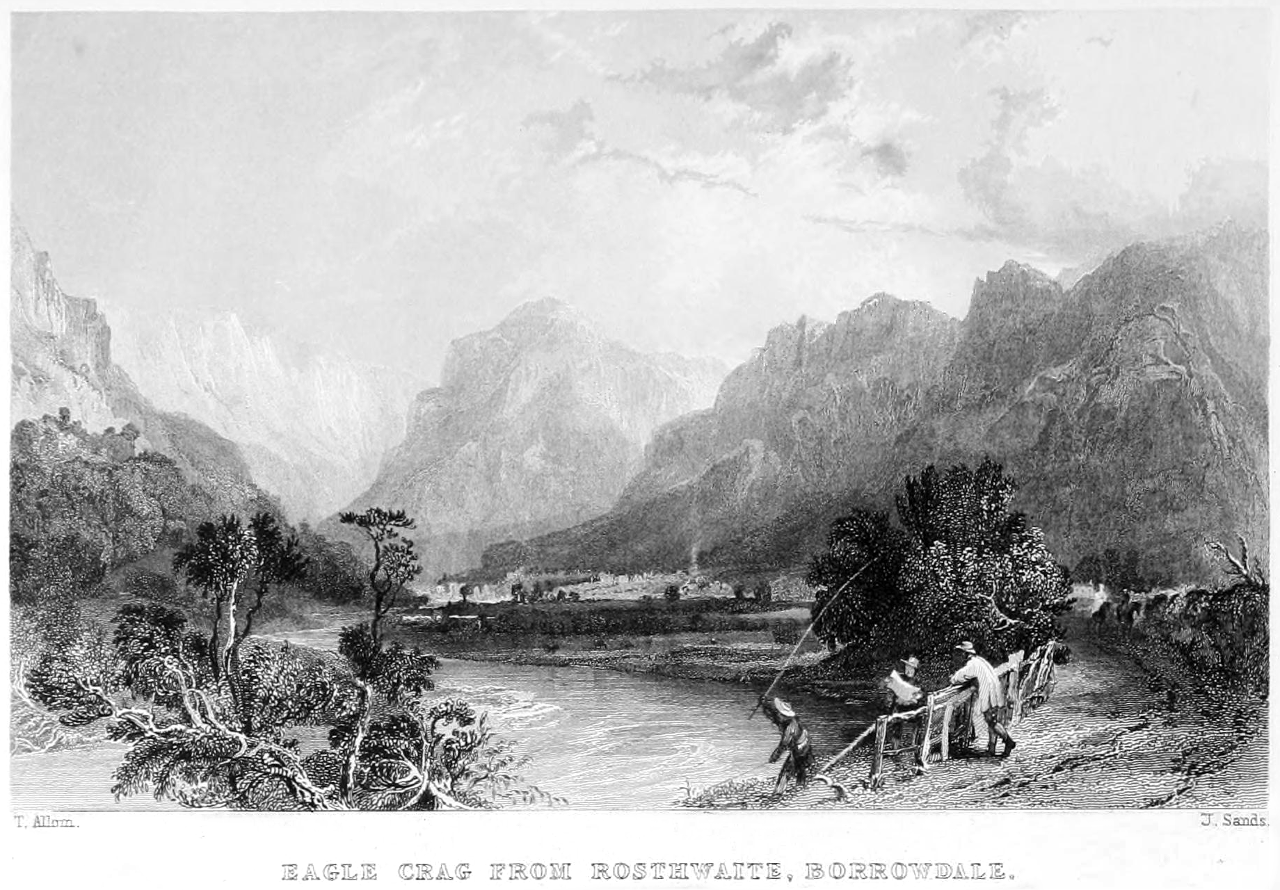 This view of Stonethwaite and Eagle Crag was sketched by Thomas Allom at the south end of the small fields which stretched south from Miss Barker's house between the river and the road. |
RANDOM EARTHQUAKE"EARTHQUAKE IN CUMBERLAND! - 'Having been from home this week end, I am obliged to give you a rather hurried account of an earthquake by which this neighbourhood was visited about one o'clock in the morning of Wednesday last; how far it may have extended I have not been able to ascertain. Most probably you will have received communications from other places, relating the circumstance; in consequence of which it may suffice to say, that it has been more or less very sensibly felt throughout the parish of Crosthwaite, particularly at Dancing-Gate, Mill-Beck, and Applethwaite, in Under Skiddaw- at Portinscale, also at Seatoller, and Seathwaite, and various other places in Borrowdale. The accounts from all those places particularly agree as to time and effects, which leaves no reason to dispute the cause. The noise preceding the shock, is represented by some to resemble distant thunder, but compared by others to a sudden gust of wind; and at some places, whole families were aroused, fancying that their houses were entered for the purposes of plunder. But the most singular fact is, that the water of a small brook which falls from Skiddaw, passing through Applethwaite, and which was previously used by the inhabitants, has since then been rendered unfit for use, its appearance being quite loathsome, and as if mixed with oil.' " Kendal Mercury, 7 Jun 1834: "EARTHQUAKE.- A phenomenon of this description, which though rare in this part of the world, occurred in the neighbourhood of Keswick, between the hours of one and two o'clock, in the morning, on Wednesday week. It would seem (as no account is rendered of it from any other part) that it has been entirely confined within the limits, and range of those towering and majestic mountains, by which that far-famed vale is so romantically encircled. In a direction situate between, and particularly lying contiguous to the bases of the two stupendous mountains, Skiddaw and Scawfell, the shock seems to have been the most sensibly felt. At Mirehouse, (near to the foot of the former) the residence of John Spedding, Esq., distant about four miles north of Keswick, and at Seathwaite, in Borrowdale, (near to the foot of the latter) distant about nine miles south of Keswick; those places were both alike affected, and they appear to have been the two extreme points visited by this phenomenon; at various places in Underskiddaw, at Portinscale, a village about a mile west of Keswick, also at Keswick; and passing beyond the Derwent Lake, into Borrowdale, to Rosthwaite, the shock has been sensibly felt to a greater or lesser degree. The air at the time of the occurrence was perfectly calm and serene, and the effect and sensation produced at the different places, corroborate so entirely, as to leave no doubt as to the cause. The shock, as is usual on such occasions, was preceded by a rumbling noise like that of carriages, or the rushing of wind; and in many places whole amilies were much alarmed. But the most singular fact is, that the water of a small brook which falls from Skiddaw, passing through Applethwaite, and which was previously used by the inhabitants, is said by them, to have been since then rendered unfit for use." Carlisle Journal, 14 Jun 1834 (from the Whitehaven Herald): "KESWICK, June 7th.- Numerous concurring accounts have, during the last few days, been received from various places in the neighbourhood of Keswick respecting the earthquake named in the last week's Herald, which corroborate each other so entirely as to leave no doubt as to the fact. It appears to have been entirely confined within the range of those majestic mountains with which that delightful valley is encircled. The stupendous Skiddaw and Scawfell seem to have been the two extreme points visited by this phenomenon, it having extended along the base of the former in a northern direction to the distance of about four or five miles, and to the distance of about nine or ten miles in a southern direction, up to the base of the latter, affecting all places (either more or less) lying in the tract between them." [NB: This dramatic news was very much upstaged by the reports from South America of a major earthquake, which devastated entire towns and was featured in preference by, for example, the Westmorland Gazette. The above accounts clearly come from the same correspondent, who is likely to be watchmaker, writer and geologist Jonathan Otley of Keswick.] |
RANDOM SIMPSONS:"An unfortunate accident took place at Whyfoot side quarry [aka Quayfoot, I think], in Borrowdale, this day week, which might have been attended with loss of life. Three men named Thomas Simpson, Richardson Earl, and John Earl, the lessees of the quarry, were working, a large quantity of rock suddenly fell and buried all the three men under the broken fragments, yet in such a manner that they were able to call for assistance. The attention of a person passing the place was directed to the spot in consequence of the moans of the sufferers, and aid being promptly obtained they were all liberated with as little delay as circumstances would admit of, when it was discovered that one of Simpson's thighs was fractured.- Mr. Edmonson, surgeon, was immediately sent for, under whose professional skill, assisted by Mr. Stoddart, surgeon, the three sufferers, though much bruised, are all doing well." Cumberland Pacquet, 25 Jun 1839: Deaths: "At Rossthwaite, in Borrowdale, near Keswick, on Monday week, Mr. Thomas Simpson, aged 55 years. The deceased was one of the unfortunate quarrymen who, a few weeks ago, met with a serious accident in that neighbourhood. The unfortunate man had his thigh broken in Whyfoot slate quarry, and was otherwise dreadfully crushed; he bore an exemplary character through life, and has descended into the grave universally lamented." Carlisle Journal, 12 Oct 1839: "Marriages At Crosthwaite Church, Keswick, on Saturday last, Mr. Thomas SIMPSON, broker, New York, America, eldest son of Mr. John SIMPSON, of Rossthwaite, in Borrowdale, to Miss Sarah WILSON, of the same place." |
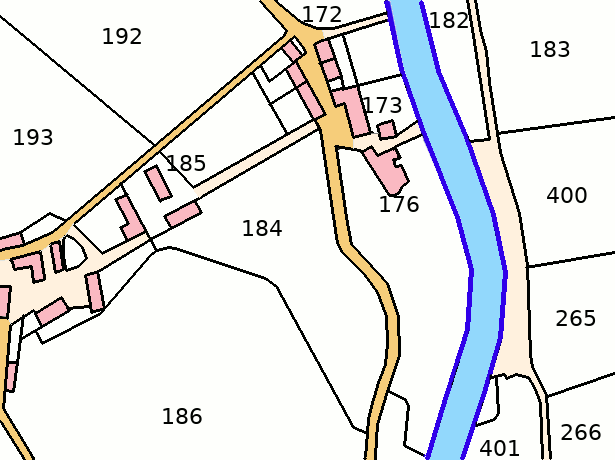 |
RANDOM SIMPSON:DEATHS: "At Rossthwaite, in Borrowdale, on the 28th ult., Mr. Joseph Simpson, son of the late Mr. Thomas Simpson, formerly of the High Low Door, in Borrowdale, aged 34 years. The deceased was a pawnbroker in New York, America, and had been induced to visit his native vale for the benefit of his health." [New York trade directories from later in the 19th century list a growing number of Simpson pawnbroking outlets, as the family there built on its success] |
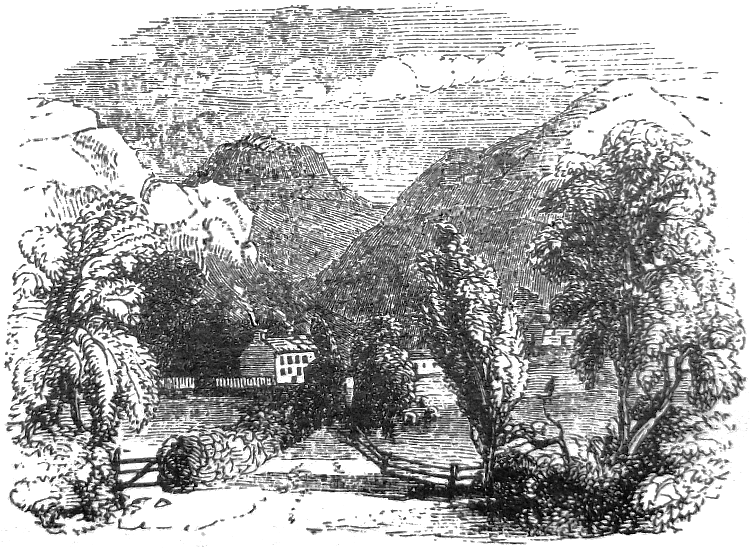 Illustration of Rosthwaite, heading the Borrowdale chapter in Sylvan's Handbook. The artist (Thomas or Edward Gilks) has played multiple tricks to heighten the drama of the scene. The viewpoint seems to be Rosthwaite Bridge, several minutes' walk from the village- in effect we are looking through a telescope. It is, moreover, a magic telescope which has almost doubled the height of the fells around the village, and shifted them left, relative to the road line, to provide a more harmonious and dramatic composition. |
RANDOM STUFF:"MOUNTAIN TOURISTS.- On Wednesday week, a remarkably fine day, thirteen different parties availed themselves of the opportunity of ascending the far-famed Skiddaw. Nearly all the guides were engaged for the occasion, and at one time there were no less than 65 persons upon the mountain, besides a great number of ponies. There has not been such a multitudinous invasion of Skiddaw in any one day during the season. The fine weather on Wednesday appears to have bee particularly attractive to tourists. The far more rugged and secluded Pike of Scawfel had a score or more visitors, including ladies. By extraordinary efforts, one party had managed to get ponies up the steep pass of Rossett Gill, and as far as within a mile or so of the summit of the rugged Pike." |
RANDOM RAMBLING STUPIDITY:"PERILOUS DESCENT FROM SCAWFELL PIKES.- On Wednesday week, a party of nine individuals from the neighbourhood of Keswick set off for the purpose of making a tour to Scawfell. The day was favourable for the excursion, and all passed off agreeably, until they reached that part of the mountain where the ponies are generally left. Here they alighted and gave the ponies into the charge of a person engaged for that purpose, and now began the most difficult part of their ascent. At the same time the clouds began to lower, and patches of mist came whisking past the excursionists; but nevertheless they pressed on, determined to reach the summit, which they did after much toil and fatigue. The mist now became so thick, that they were unable to see ten yards before them, and the difficulty was how to find their way down again. By some means or other the party got separated, and, after groping about for several hours, some found themselves in Eskdale; others were contented to stay upon the mountain all night; and only two out of the nine found their way to where the ponies were left and were glad to avail themselves of their services. These brought intelligence of their friends being missing, when several individuals set off in search of them (some with only their slippers on), but nothing could be heard of them until next day, when those who had been upon the mountain all night found their way to Rossthwaite. Fears, however, were entertained for the fate of the other three, when the worthy curate of the parish (the Rev. A.R. Webster, who was one of the party) again set off in search of them. In course of time, he found that they had made their way to Eskdale, and from thence to Drigg, from which place they made the best of their way to Keswick, where they all met, rejoicing to see each other after such a miraculous escape from broken bones. The party was composed of both ladies and gentlemen, and long will they remember the excursion to Scawfell." |
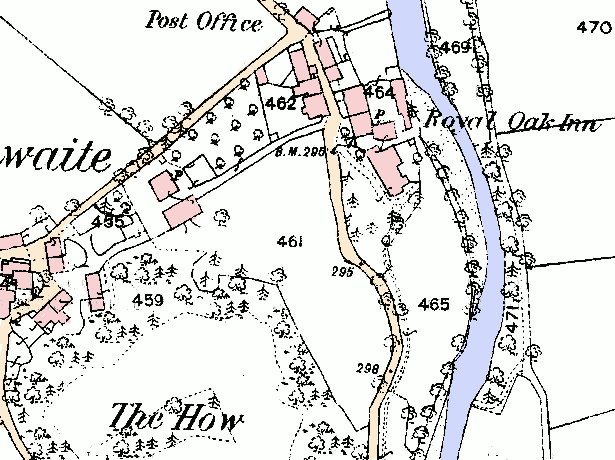 Ordnance Survey 1:2500 Cumberland sheet Sheet LXX. 10, surveyed 1862. Plot acreages from Book of Reference are, 461: 1.771a; 462: 0.979a; 464: 1.091a; 465: 0.969a; 469: 0.564a; 471: 0.338a |
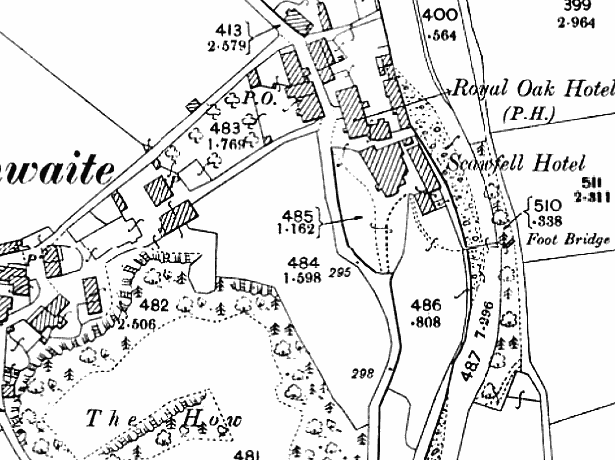 Ordnance Survey 1:2500 Cumberland sheet Sheet LXX. 10, 1898. |